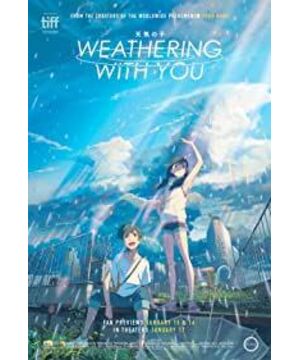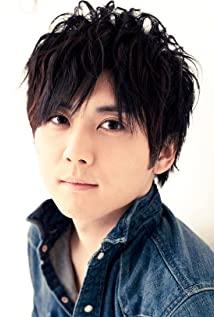Originally published in The Paper https://www.thepaper.cn/newsDetail_forward_4895068
"World Department" and Depoliticization A common criticism of the film is that it fully exposes Makoto Shinkai's "anti-social" tendencies, as the protagonist firmly chooses the latter between the "big world" of society and the "small world" of private love, and even At the expense of the "big world". The distinction between "big world" and "small world" is called a typical setting of "world system" (from the Japanese critic Hiroki Toshi), "big world" refers to the world in which the entire human group lives," "Small World" refers to the world formed by the personal love of the protagonists. The social factors between the two, such as history, economy, politics and other elements, have not been fully described in the works of the world department, and even if there is, it is only the love of the protagonists. It is only the background board, so the works of the world series are generally considered to be works with young people with little social experience as the main audience. Makoto Shinkai may be one of the directors most labeled as "world department". From the early work "Voice of the Stars" to the topic "Your Name" a few years ago, this term will always appear in related discussions . In this new work "Weathering With You", the opposition between the two worlds is clearly shown, and the controversy among the audience is thus magnified: on the one hand, some people criticize Xin Haicheng as a contemporary youth representative who is indifferent to politics. No longer care about what happens in social reality, and do not devote themselves to public affairs, but only indulge in private love; on the other hand, some people defend Xin Haicheng, saying that his film is to oppose the above kind of The perspective of an "adult", this perspective can be represented in the film by this sentence of the middle-aged man Keisuke: "If you sacrifice a sunny girl, you can return to the sunny sky in Tokyo, then everyone is willing", and " "Children" resist the notion that no one can sacrifice the one he loves, no matter how noble the purpose is. They believe that Makoto Shinkai's films are fairy tales after all, and they have no responsibility to convey the social and ethical responsibility of "collectivism". "Your Name" stills The debate above has fallen into a dead end where no one can convince anyone, and what they have in common is the absolute distinction between public life and private love, perhaps in part because commenters put Dong Haoji The term "world system" is used out of context. The depoliticization of the individual is not a new phenomenon. The French Hegelian philosopher Kojève mentioned that after the end of history, the individual will be "animalized" and no longer need to participate in the process of history as a political subject. Animals obey management like that, and it is enough to pursue personal happiness. But Dong Haoji is not entirely satisfied with this view, the connection between the public and the private in an "animalized" postmodern society Form has always been an important subject of his thinking. In his recent book, The Philosophy of the Tourist, he emphasized that although traditional leftist ideology has declined, the relationship between political and apolitical, serious and banter, private pleasure and public events is "undecidable" (Derrida's term), there will always be mismatches between these binary oppositions. To get rid of these simple oppositions, we need a new theoretical framework to discuss this issue. And the exchange pattern theory proposed by Hiroki Hiroki, a thinker who has a deep influence, is very suitable for analyzing this film. Witchcraft and Family First, we will briefly introduce the four types of exchange that have appeared in history. Rain, sacrifice and other rituals are used to exchange for the protection of gods. If you receive gifts and do not return them, you will be cursed; in exchange pattern B, people sacrifice their freedom in exchange for the protection of communities such as clans and countries; exchange pattern C is today's The capitalist system that dominates the world is exchanged through a general equivalent currency; and exchange pattern D is a "universal religion" whose goal is "the creation of a united and mutually supportive community of individuals (not rooted in the state)." In modern society, the exchange pattern of C and B is dominant, and A is in a state of repression (but it is not completely absent, for example, in the family "filial piety" still follows the law of barter), but it is The "repressed," as Freud called it, never completely disappears, but always returns compulsively and repeatedly. So perhaps the key issue in the film is not just the opposition between the public society and the private sphere, but also the relationship between these four exchange styles, none of which are entirely private, but all play a role in connecting society. Witchcraft and family, two of the common examples that Kariya Pedestrian talks about about exchange pattern A, are also the two threads of the film. Exchange Style A was derived from the anthropologist Moss's study of primitive peoples, who were cursed when they received gifts but didn't return them. From the perspective of Kariya's theory, the ability of Yangna to make the sky clear can be said to be an exchange with the god of weather, which should be the tradition of sacrifice of "human pillars" in Japan. But it should be noted that what the old priest said in the movie is not to treat abnormal weather, not to predict and control the weather like modern science, but to make a deal with the weather god for the needs of human beings. The god mentioned here is a pantheistic god, not a transcendent god in the sense of Abrahamicism (Judaism, Christianity, Islam). Following the law of exchange, when a gift is received, it must also be given in return. Haruna's control of the weather has not failed because of the compulsion of exchange, but it is very different from the control of nature by modern technology. But what the movie does is not just a re-enchantment of ancient witchcraft, because the so-called witchcraft does not only appear at the level of the "big world", but also at the level of the "small world". Sex, the bond between those people in the movie, is based on this kind of coercion, we can call it a kind of "family love" , the family mentioned here has nothing to do with blood (just as the movie does not describe Hogao's original family, in some cases in real life, the family based on blood is more of an exchange style B that exchanges freedom for protection, because Children obey their parents only for their financial support, not out of filial piety), but only in a compulsive relationship based on exchange. How did this conclusion come to be? At the beginning of the movie, Hodaka, who had left his native family, came to Tokyo alone. On the boat to Tokyo, he invited a strange uncle Keisuke for a meal and beer. In return, he came to Keisuke, who was helpless in Tokyo. His office, Keisuke and Natsumi from the office took him in, and they lived together like a family. Similarly, Hina gave Hodaka a hamburger when he didn't have money to eat, and then he desperately rescued Hina when he saw her being wooed by the folks at the custom shop. The protagonist came out of the family of origin, and without an identity document, he also cannot enjoy the protection of the state like an adult citizen (exchange pattern B), nor is he qualified to sell his labor force in the capitalist world (exchange pattern C) (although It is impossible to expand in this article, but it is worth mentioning that in Kariya's theory, the exchange of style C always requires the support of style B). But in these "people who have nothing" (a lyric of the film's theme song), the two dominant exchange patterns in contemporary society have failed, and the law of exchange pattern A is more clearly presented, they cannot Reject the coercion of the law of barter, so the kindness you receive must be repaid. "The Thief Family" stills This also explains Hodaka's determination to save Hina in the end, although it is incomprehensible to many viewers. Many comments attribute it to the power of "love", but this kind of love is obviously not the exclusive love of monogamy in modern society, because the film does not depict a competitive love relationship, but instead depicts men and women at length. The bond between the protagonist and other people: Ru Fangao's close relationship in the two "families" of the office and the Yangna family. This kind of family structure that is temporarily formed to help each other can not help but remind people of the Japanese movie "The Thief Family" which was released last year. What they have in common is that this kind of temporary family is fragile when faced with external power, and power will Destroy this relationship in the name of security, because exchange pattern B (governance in exchange for freedom for security) suppresses the development of exchange pattern A. In Weathering With You, Hodaka, who has no ID card (B) and no money (C), survived briefly in Tokyo by relying on the most primitive exchange mode A, but then the police hunted him down again, and Keisuke was refused to take him in to avoid the punishment of power. But the movie still has a fairy-tale optimism. In the end, everyone helped him to save Yang Cai, perhaps because they all received Yang Cai's "gift" (the weather became clear), so they had to "return the gift". In this sense, it can be said that the "Son of the Weather" Haruna is also everyone's child. This new family style may be the fourth exchange style that Karatani said: "A united and mutually supportive community of individuals (not rooted in the state) creation". children's politics Now, the binary opposition between the big world and the small world can be resolved by the theory of exchange style. From the above analysis, we can see that even if it seems to be a private love relationship, it follows the social exchange law. What this film (of course, this is not the patent of Makoto Shinkai, but a topic that Japanese films and literature have been exploring since the 1920s) is to weaken the repression caused by exchange patterns B and C (power, capital and other social elements) , which focuses on the imagination of the return of exchange pattern A. The author agrees with what many people have pointed out, that this kind of imagination is a kind of childish imagination, and one of the important reasons why it is childish is that this kind of imagination is "irresponsible": the film never depicts the high sailor or the sun. Cai or other characters who assist them feel guilty about the consequences of their actions (also in "Your Name", the two people who saved the village did not become "heroes" in the American blockbuster), Hodaka said " We changed the world" doesn't mean "we caused the Tokyo flooding", it means that their private actions happen to be involved in the world by chance, and the change of the world is just a contingency for them (whether it is for "society" is good or bad), they are not responsible for it. We certainly cannot conclude that this is not an excuse for not being politically and socially concerned, but a theoretical coordinate can be given for such an action. If the action of the traditional left is a conscious action of "adults" who use ideas to change the world, then even if the actions of "children" are closer to actions under unconscious compulsion, it does not mean that their actions Society is meaningless. The hierarchy of "adult-child" is repeatedly blurred in the movie. For example, Hodaka calls Hina's younger brother, who is in elementary school, "senior". Political occasions require a little girl to pray for sunny days, etc. When the world has fallen into madness, the opposition between children and adults is blurring, adults are no longer a guide with more knowledge of the world for children, adults even Ask your child for help. In traditional patriarchal politics, we need to worship a knowledgeable and prestigious "father" who carries our will and is responsible for "all of us". But "Children's Politics" is the opposite. It is not responsible for "all" but only one. But "child politics" is precisely not about making people children, but about becoming "parents" of children, accepting and repaying what we get from children. "Being a parent" has nothing to do with knowledge and experience, just as in the movie younger people can help, take care of, and protect older people people do. Becoming a parent to those kids means that people stop loving the authority that protects us as a vulnerable child, or act irresponsibly as a child, but as a parent (without more authority) To love those "ignorant" children and expect their actions to bring us new possibilities, just as we watch a "Juvenile Xiang" work as an audience. This is an ethic derived from a family, but when it leaves the family based on blood and returns to society, can it shape a socio-political form as Karatani said?
View more about Weathering with You reviews











